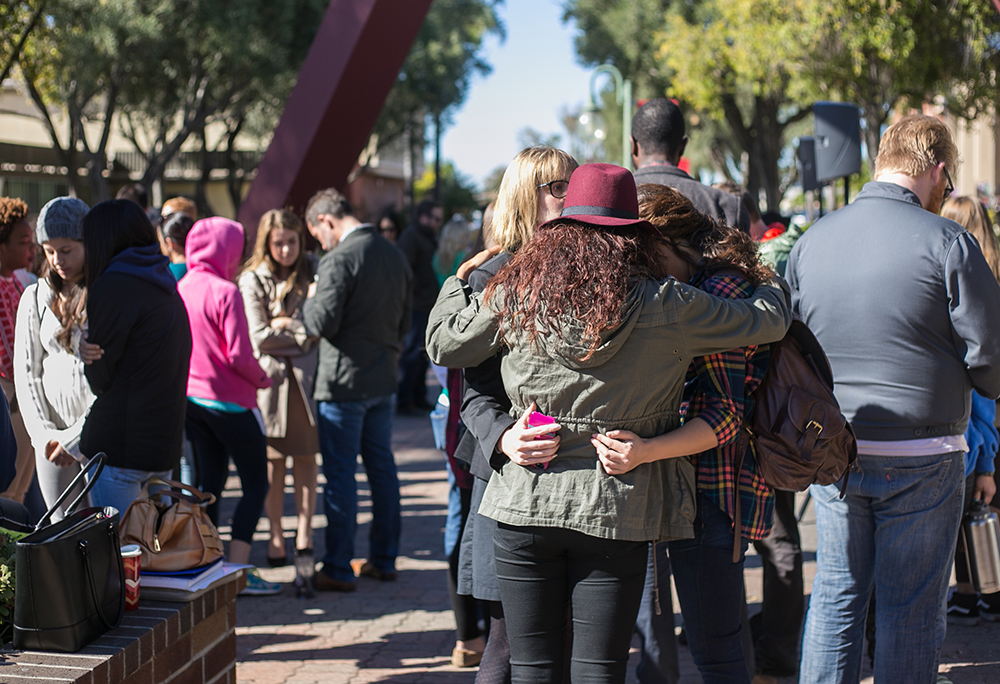The recent events at Yale, Missouri University and Claremont McKenna raise difficult questions for Biola about free speech and creating a safe space for people to express themselves without feeling uncomfortable.
The main point of contention was whether students should be free to say what they want or whether marginalized students should be given safe spaces so they can feel free to describe their pain.
Todd Thompson, assistant professor of history with the Torrey Honors Institute, explained how safe spaces are necessary for truly free and effective dialogue.
“At the root [of the hunger for safe spaces] is the desire to be heard and to create the best conditions for that hearing. This is coming, I think, on the heels of years and years and years of absence of discussion, absence of dialogue and absence of patient listeners,” Thompson said.
A DIFFERENT VIEW
Tom Crisp, professor of philosophy, took a slightly different view, explaining the idea of a safe space makes him concerned.
“We’ve hit a point of a lot of widespread popular anger about a lot of injustices that are being perpetrated on the black community that are widespread, systematic and egregious, and so I think there is a lot of anger about that is totally justified,” Crisp said. “There’s another movement on college campuses about creating safe spaces that I’m a little worried about. I guess I think college campuses have to be places where a huge variety of ideas are tested and argued about and confronted, and some of them are going to be hurtful.”
Crisp described how professors at various universities were under pressure not to teach certain texts containing offensive content. However, he feels all ideas need to be interrogated in order to find truth and attack lies.
Crisp also disagreed with some of the tactics of the protesters, considering them to be bullying. For example, in Missouri, professor Melissa Click was so adamant that journalists would not enter the campground of protesters that she called for “muscle” to remove one of them. Several protesters at Yale University loudly shouted down professors and other students on different occasions. Crisp cited Martin Luther King Jr., Gandhi and Jesus as leaders who set examples for peaceful and respectful protest for justice.
IMPORTANCE OF SENSITIVITY
However, Crisp disagreed with safe spaces at colleges, but supported the importance of sensitivity.
“I’m a little more sympathetic to the idea that a university might encourage its students to be sensitive; [it’s] an appropriate role for a university to play,” Crisp said.
Stephanie Lindo, junior journalism major and event coordinator of Multi-Ethnic Programs and Development, described how Biola fails in its racial relations.
“Biola does not care about people on the margins. Biola faculty doesn’t care about the people on the margins, and most of the student population does not want to have this conversation even though students that go here are affected by this conversation. [Although] there are faculty and students and staff that care, I don’t think the majority do,” Lindo said.
PAINFUL TO DISCUSS
Both Lindo and Crisp explained that many students feel like they are excluded or alienated. Lindo also described how the majority of students need to realize conversations about race can be incredibly painful to discuss. Emma Foster, senior business major, agreed.
“A lot of people are hurt over [marginalization] at Biola,” Foster said. “To students who think there are no issues over here, be ready to hear stories about negative experiences.”
However, Biola has advantages over other schools — Thompson’s final words offer an encouragement for every student on campus.
“We’re not necessarily better than other institutions, [but] I do have faith in our administration and I think that our common theological convictions can save us from despair and they can inform our practices of patience with each other and can jar us out of complacency,” Thompson said.







